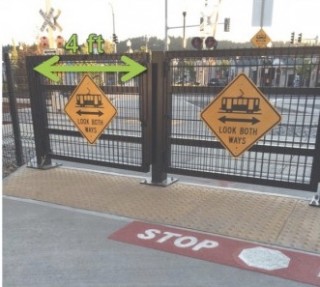Official Bureau of Transportation committees that represent two of the groups TriMet is trying to keep safe from MAX trains on the new Orange Line — people who walk and bike — oppose the agency’s plan to use swing gates at the entry and exit of tracks at two intersections in inner southeast Portland.
After hearing about plans for the path at SE 8th and 11th, the City of Portland’s Bicycle Advisory Committee and Pedestrian Advisory Committee have both issued formal letters of opposition to TriMet.
The bicycle committee outlined several reasons for their disapproval. The main reason is, “the operating difficulties they will impose on members of the traveling public – principally those who are bicycling or walking.”
Here’s more from their letter:
“As you heard at the BAC [Bicycle Advisory Committee] meeting, these swing gates pose difficulties for those using non-standard (but not uncommon) bicycles. These include cargo bikes, especially front loading cargo bikes used to transport children. They also include tricycles, and recumbent bicycles. The population using these bikes, especially the latter two types, often include seniors and others who may be experiencing physical challenges that make it difficult for them to operate a standard bicycle. The swing gates will make it awkward, if not impossible to proceed through the area while sitting on the bicycle itself. The difficulties of people bicycling and dismounting and then pushing their bikes through the gates is unknown at this point as that has not been tested. We are concerned about this particularly at 8th Avenue which is part of the routing for one of the city’s planned Major City Bikeways along an alignment that generally follows 9th Avenue.”
Advertisement
Both the BAC and the Pedestrian Advisory Committee also expressed serious concerns about mobility issues the gates would present to people with severe disabilities. When a BAC member asked TriMet what would happen if a quadriplegic tried to use the gates, committee Chair Ian Stude says that input was, “simply dismissed by [TriMet] staff.”
The Pedestrian Advisory Committee (PAC) said they oppose swing gates because they, “would be very difficult if not impossible for people with disabilities to use.”
For their part, TriMet does appear to have modified their proposal after the BAC meeting on July 14th. When they brought the plans to the PAC on the 21st, they had made some revisions. According to someone who was at that meeting, TriMet is now considering using “switchback” type crossings at SE 8th. These crossings are common on current MAX lines on N Interstate Avenue and E Burnside. They require people to make a sharp zig-zag turn prior to entering and exiting the tracks.
In a statement last week, TriMet said they’re “continuing to work on alternatives that respond to the feedback we’ve received from the community, our partners and from our safety and security team.” The agency expects to announce next steps by the end of this month.


